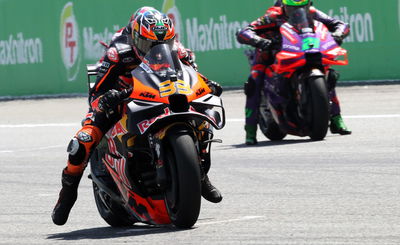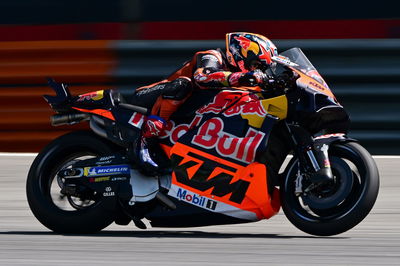MotoGP starts: “We have 4 front holeshot options...”
"It’s just understanding what’s working... by picking the dirtiest spot on the grid and seeing what you can get away with!"

MotoGP riders spinning the rear tyre during practice starts has been a frequent sight this season.
Rather than simply overestimating the grip on a dirty track, the link between start wheelspin and front holeshot devices was confirmed at the recent Thai Grand Prix.
After a burnout during his Friday practice start, KTM’s Jack Miller said:
“We just wanted to try the ‘110’ [holeshot] device. I'm not a big fan of the 110 device honestly, as soon as you put the bike down that low on the front the rear starts spinning almost immediately,” Miller explained.
Buriram also saw the first wet grand prix of the season, when some riders opted not to activate the front device at all, in the hope of getting more initial grip from the rear.
“I was without the front device at the start, because the team said to me it’s better you don’t put it, because you can spin with the front device,” Ducati’s Enea Bastianini said. “But in the end, the riders with the front device on were more competitive at the start.”

Low and Lower: The GP23 (Bezzecchi) starts visibly higher than the factory GP24s ahead of him on the Buriram grid.
In high-grip conditions, the performance limit during a MotoGP start is the amount of wheelie, hence dropping the bike as low as possible (front and rear) is beneficial.
The differences in lowering ability depend not only on the brand but also the bike spec, with the factory GP24 Ducatis having a visibly lower starting system than the older GP23s.
But when grip levels are reduced due to a dirty track or wet surface, the balance switches from controlling wheelies to wheelspin. Especially with MotoGP bikes now dropping so low, reducing weight transfer onto the rear.
Jack Miller: "We have four options"
Last Friday at Sepang, Miller confirmed that KTM has multiple lengths of compression for its front holeshot device, to suit different grip levels.
“It’s to do with the front end, obviously with the front start device. So we are just playing with different stroke lengths,” Miller said of the wheelspin seen by riders during practice starts.
"We have four options, I think: A 110, 100, 90 and then an 80 and it is just a matter of understanding what’s going to be working.
“Obviously in high-grip conditions you jam the thing down like a drag racer.
“But in lower grip conditions, you kinda want to play with a little bit more weight on the rear, so you go back to say the 80 or the 90.
“It’s just understanding what’s working at that track, by picking the dirtiest spot on the grid and seeing what you can get away with!”
That balancing act between front drop and wheelspin probably also explains why Ducati title leaders Jorge Martin and Francesco Bagnaia have struggled with poor practice starts - but usually perfect their launches by race time.

At Sepang, Miller also revealed that he had received a modification to his rear ride-height device, deployed on entry to the long straights.
“We had an update just in the clicks in the ride-height device this weekend, something we asked for at Phillip Island last year, so we got an update with two races to go,” said Miller, who later had a lucky escape when his helmet tangled with Fabio Quartararo’s rear wheel at Turn 2 of Sunday’s race.
“It’s just to be able to play with the pace a little bit more, try to slow the ride-height device down to help us not overload the tyre on exit.
“It feels really good coming onto both of the straights. We are not getting a massive hit that is turning into pumping or spin, so that’s definitely been a positive.”
Brad Binder: "You’re cutting half-a-second from 0-100km/h"
All starting (holeshot) and ride-height devices will be banned under the new technical rules for 2027.
“I’ll definitely miss them at the start,” Miller’s team-mate Brad Binder said in an interview with Crash.net.
“They honestly turn [the bikes] into dragsters. The reality is they are so low that everything is almost scraping [the ground]. And you can use so much more power now.
“If we look back to when we used to launch without the devices, and with them, in three seconds you’re cutting half-a-second from 0-100km/h. It’s crazy! The amount we’ve gone forward because of them is insane.
“But if [removing them] is the same for everybody, it doesn’t change too much.”












